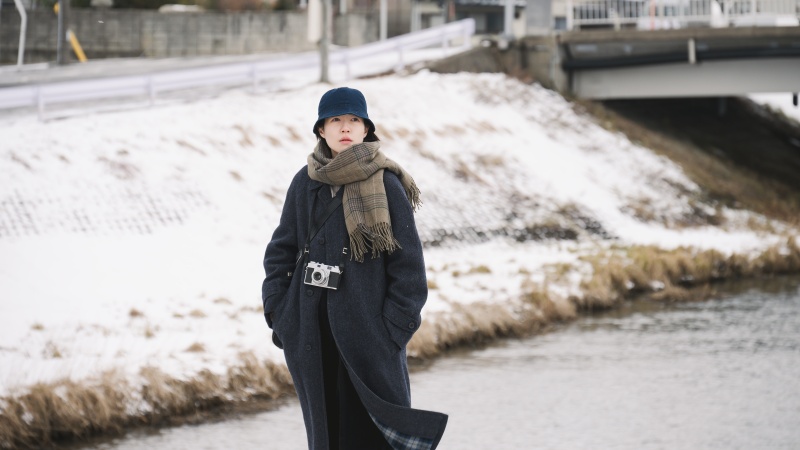Two Seasons, Two Strangers
Tabi to hibi
VERDICT: Gently engaging the viewer with whimsical tales of two couples and reflections on the artistic process, Shô Miyake’s Locarno Golden Leopard winner ‘Two Seasons, Two Strangers’ skillfully plays a wide range of chords from melancholy to amusing, tragic to poetic.
In Two Seasons, Two Strangers (Tabi to hibi), Shô Miyake’s fifth feature film and the follow-up to his well-liked boxing movie Small, Slow and Steady, the viewer is presented with a Japan without people, where deserted holiday landscapes stand in for the characters’ inner beings, and soothe the tension and confusion they bring from their normal lives. The theme of loneliness and isolation looms large, as does the urge to connect to other people and heal – a positive message that ends the film on an upbeat note, despite the considerable amount of darkness that has gone before.
Like a Hong Sang-soo film with more narrative, Two Seasons is all about modern relationships and how difficult they are to make work. The director seems to wink at Hong by making one of his central characters a Korean woman screenplay writer who has moved to Japan, and who finds herself in an unpleasant bubble of isolation and insecurity. In one scene she attends the screening of a film she wrote and has to do a Q&A alongside the film director. Tongue-tied and embarrassed, all she can say is ,“I have no talent.” But the mood shifts to humor when she’s asked what she’s currently working on, and she mumbles something about a ninja project that can’t get off the ground.
Based on the 1960s mangas “A View of the Seaside” and “Mr. Ben and his Igloo” by Yoshiharu Tsuge, the two stories interconnect in a complicated way. The first, about two lonely young people who meet on the beach, is cleverly prefaced by a scene showing Li (Shim Eun-kyung) open her notebook and begin a fresh screenplay writing “Scene 1: Summer: Seaside.” The strong implication is that she is creating the story that follows. Ergo, it’s “just” a story and the audience is challenged to remember that nothing on screen is real.
Yet when Nagisa (Yuumi Kawai) arrives in a chauffeured car in the fishing village on a hillside, now an oddly deserted resort town, we are instantly plunged into the girl’s unhappiness. As she mentions to Natsuo (Mansaku Takada), a lonely boy she chats to on the beach, she has been abandoned by someone and is trying to forget. The two hit it off, but the next day it is raining hard. Nagisa removes her dress, revealing an enticing bikini, and challenges Natsuo to go swimming anyway, despite the evident danger of tall waves crashing far from shore. The hint of eroticism blends sickeningly with a hidden death wish.
In the second, much lighter story, Li is hungry for adventure and relives, in a different key, the story she has written. The scene shifts to winter and a holiday town high in the mountains. A snowstorm is in progress as Li arrives by train, bundled head to toe against the elements but with no hotel reservation. Surprise, all the available rooms are fully booked. Li finds herself alone on the snow-obliterated road with a map in hand, the wind rising, and sets off with comic hopelessness to reach a traditional mountaintop inn before dusk falls.
Like the beach story, the environment assumes a huge influence over the characters’ mood and well-being. With the streets drained of people, these utterly Japanese locations become full of symbolic significance in director of photography Yuta Tsukinaga’s majestic visuals, which underline the smallness of human beings in such a powerful natural world.
But the feeling shifts to manageable when Li finds the inn, an impressively prehistoric affair whose neglected exterior and interior look adapted from a samurai epic. It is owned and run by Benzo (Shinichi Tsutsumi), a gruff hermit of few words, who casually tells Li to bed down anywhere she likes – it’s a one-room hut. Their relationship grows from there, though not along the erotic lines that Li’s young couple seemed ready to take. For one thing, Benzo has an ex-wife and daughter living in a much more upscale inn up the road, a fact Li learns in a jolly nighttime trek through the snow to steal a golden carp from their pond. Mayhem ensues. In the end, Li admits it’s the most fun she’s had in years – a healing experience rather than a romance, but leaving audience and characters alike with a positive glow.
Director: Shô Miyake
Screenwriter: Shô Miyake, based on a manga by Yoshiharu Tsuge
Producers: Masayoshi Jonai, Yuji Sadai
Cast: Eun-Kyung Shim, Yumi Kawai, Shinichi Tsutsumi, Mansaku Takada, Shiro Sano
Cinematography: Yuta Tsukinaga
Editing: Keiko Okawa
Music: Hi’ Spec
Sound: Takamitsu Kawai
Production companies: The Fool, Bitters End
World sales: Bitters End
Venue: San Sebastian Film Festival (Zabaltegi/Tabakalera)
In Japanese
89 minutes

